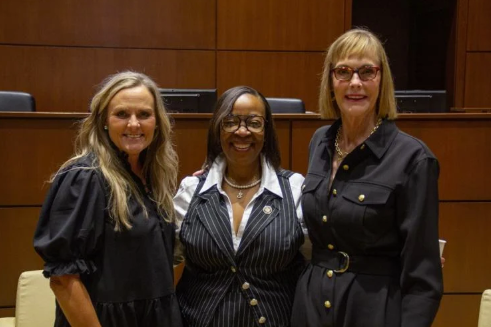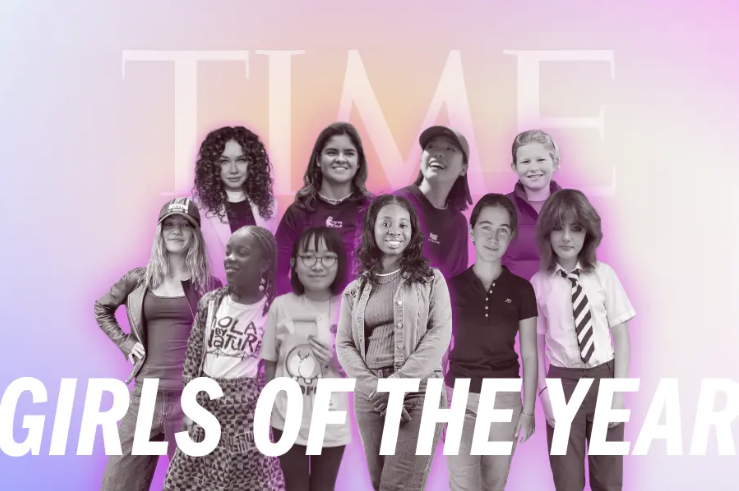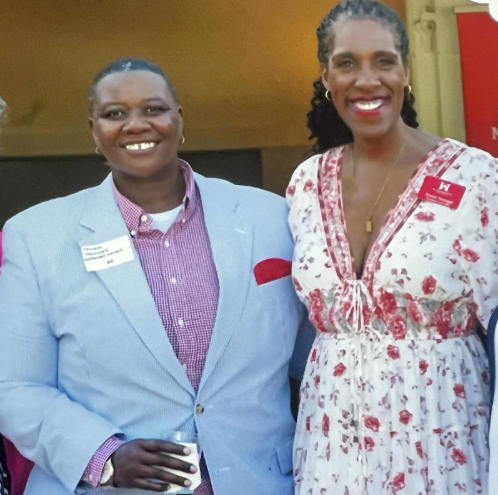Weekend Reading on Women’s Representation is a compilation of stories about women’s representation in politics, on boards, in sports and entertainment, in judicial offices and in the private sector in the U.S. and around the world—with a little gardening and goodwill mixed in for refreshment!
‘Let Mother Vote’: Remembering the Letter That Secured the 19th Amendment

On Aug. 18, 1920, Tennessee became the 36th state to ratify the 19th Amendment when young legislator, Harry Burn, followed the advice of his mother, Febb Burn, and cast the decisive vote in favor. Febb—a college-educated widow who read three newspapers a day and strongly felt her mind was the equal of any man’s—had long impressed upon her son the importance of suffrage.
By the summer of 1920, the 19th Amendment was making headway, but it was still one state short of the 36 needed for ratification—leaving Tennessee as the final battleground. Leading up to the critical vote, it appeared headed for a tie, and Harry himself had initially sided with the opposition. Knowing that this crucial decision for women across America hung in the balance on her son’s vote, Febb sent Harry a seven-page letter filled with local news and gossip. But on the final page of the note were the words that would change history:
“Dear Son, … Hurray and vote for Suffrage and don’t keep them in doubt. I noticed Chandlers’ speech, it was very bitter. I’ve been waiting to see how you stood but have not seen anything yet…. Don’t forget to be a god [sic] boy and help Mrs. Catt with her ‘Rats.’ Is she the one that put rat in ratification, Ha! No more from mama this time. With lots of love, Mama.”


On the day of the vote, wearing a red rose—the symbol of the anti-suffragists—pinned to his jacket and Febb’s letter tucked in his pocket, Harry surprised the chamber and voted “aye.” That single vote made Tennessee the decisive 36th state, securing ratification of the 19th Amendment and forever changing the course of U.S. history.
The words of Febb continue to echo through American history, capturing the spirit of the movement—a spirit now brought to life in the Broadway musical Suffs, which is set to go on tour this fall. In the song “Let Mother Vote,” the refrain still rings true:
“Let mother vote, we raised you after all
Won’t you thank the lady you have loved since you were small?
We reared you, cheered you, helped you when you fell
With your blessing, we could help America as well.”
While Tennessee’s ratification was a landmark milestone, it wasn’t until the Voting Rights Act and other measures decades later that all women were fully enfranchised. Still, the suffragists’ spirit remains as urgent—and the song reminds us again:
“Let mother vote, we’ve got the recipe
For a well-balanced government, fresh-baked with decency.
Two cups of moral fiber, add a dollop of good grace,
Mix in maternal instinct, and the world’s a better place.”
Today, we remember the power of words—and how one voice, one letter, one woman’s vision for change can shape history and inspire generations of women to come.


If you ever find yourself in Knoxville, I encourage you to visit the monument to Febb and Harry, and perhaps leave a yellow rose in her honor.
Additional milestones this week include the birthdays of: Rosalynn Carter, former first lady; Ashley Houghton, FairVote; Chelsea Nunnenkamp, head of strategy and Operations at Unite America; Donna Allen, founder of the Women’s Institute for Freedom of the Press; Sara Guillermo, CEO of IGNITE; Kathy Castor, U.S. representative; Connie Chung, journalist; Cornelia “Coya” Knutson, first woman elected to U.S. Congress from Minnesota; Beth Hladick, policy director at Unite America; Kim Schrier, U.S. representative; Brittany Stalsburg, former RepresentWomen board member; Gretchen Whitmer, governor of Michigan; and Betsy Wright Hawkings, former chief of staff for four members of Congress.
The 2025 Gender Parity Index Shows Historic Gains and a Path to Equality
RepresentWomen’s 2025 Gender Parity Index (GPI) offers encouraging news: Women’s political power in the United States is reaching new heights, with states like New Hampshire, Oregon and Maine achieving gender parity for the first time in history. Seven more states are close to reaching parity, and women continue to reach milestones that seemed impossible just a generation ago.
In Congress, 2025 marked the first time two Black women, Lisa Blunt Rochester and Angela Alsobrooks, are serving in the U.S. Senate at the same time, while groundbreaking leaders like Sarah McBride, the first openly transgender member of Congress, are reshaping what representation looks like.

At the state level, Colorado and New Mexico joined Nevada with majority-women legislatures, proving parity is within reach.
Local politics also saw history makers, from Adena Ishii, the first Asian American and first woman of color to serve as mayor of Berkeley, Ca., to Alyia Gaskins, the first Black woman to serve as mayor of Alexandria, Va., reflecting the growing diversity of women leaders across the country.
Despite women continuing to break new ground as “firsts,” their overall share of power has shown little progress since the last Gender Parity Index was released. The United States still has a way to go, ranking 77th globally in women’s representation, but more importantly, it lags behind nearly all its major democratic allies. The GPI shows how systemic reforms, such as ranked choice voting, proportional representation, and targeted recruitment pipelines, can speed up progress:
Overall, the 2025 Gender Parity Index has shown that, while individual women have continued to break records and achieve new milestones in elected office, progress toward parity remains ever slow and uneven. Systemic change is necessary to create better and more sustainable opportunities for women to be elected and build long-term political power.
Women Voters Matter: Economic Anxiety Drives Political Change
New polling from Impact Research, commissioned by EMILY’s List Action, reveals a clear truth: Economic struggle, especially among women, is profoundly shaping the political moment heading into 2026. Nearly 45 percent of women report falling behind financially, compared to just 34 percent of men, with women of color and younger women experiencing the most significant strain.
Beyond raw numbers, the findings shed light on the question of why voters feel stuck. Women are more likely to shoulder caregiving responsibilities, often unpaid, and feel a sense of financial stagnation and skepticism about the future. Only 24 percent of women expect their situation to improve in the year ahead, compared to 34 percent of men. EMILY’s List notes:
In both midterm and presidential elections, women consistently comprise a majority of the electorate both nationally and in battleground states. Understanding women’s circumstances and priorities is essential for Democratic campaigns to succeed in 2026 and beyond, and their votes should not be taken for granted, especially as issues that matter to women — from the economy and costs to health and reproductive care — are central to both family well-being and who women vote for.
Across demographics, women consistently rank economic issues, healthcare affordability, housing, and family security as top priorities—and they are looking for leaders with bold vision, not incremental fixes.
For members of the Democratic Party, this should serve as a resounding call to action: Understanding the significance for female voters is not merely a political embellishment; it is fundamental to securing electoral victories in the midterm elections and effecting meaningful change. As EMILY’s List observes, women consistently constitute the majority of the midterm electorate.
Gender Politics Seminar Stresses Need for Women in Statewide and Federal Office

At a recent seminar in Fort Wayne, one thing became clear: Having representation isn’t enough—women need to hold roles where decisions are made. The Aug. 2 “Food for Thought” Seminar Series, put together by Advancing Voices of Women (AVOW), highlighted the structural obstacles that still hinder women’s progress to statewide and federal office, even in areas with high political engagement.
Speakers highlighted how gendered norms, limited candidate recruitment, and lingering stereotypes continue to curtail women’s political ambition, especially when it comes to pursuing high-stakes, high-visibility roles like governor, senator or attorney general. Yet, the seminar also spotlighted early-career changemakers, training programs and local networks that are shifting the narrative and pipeline locally.
Expanding efforts from civic engagement to candidate recruitment strengthens the path to parity in leadership, making it more likely that policies reflect the full range of women’s experiences, not solely their voter power.
High Home Energy Costs Hit Women Hardest, Even in the Wealthiest Households
A recent data brief from the Gender Equity Policy Institute (GEPI) reveals a stark reality in California: Women are far more likely than men to be “energy burdened”—spending more than 6 percent of their income on home energy costs, including utilities for heating, cooling and power.
This disparity holds across every major demographic, across race and ethnicity, homeowners and renters, seniors and parents. Yet, the impact is most profound among single mothers, women-led households and care providers, who shoulder both economic and emotional burdens as energy costs climb. The report finds:
Women are significantly more likely than men to be spending an unaffordable share of income on home energy costs. This is true within nearly every group. It is true within all major racial and ethnic groups. It is true for seniors and parents. It is true for renters and homeowners alike. Single mothers struggle more to pay electric bills than single fathers; women-led households struggle more than men-led and couple-led households.
In this, California unfortunately aligns with the global pattern. Throughout the world, women are at greater risk than men of being energy burdened—in wealthy democracies, as well as in low and middle income countries.
The ability to afford energy to power, heat, and cool one’s home is a critical determinant of health and well-being. As California pursues its ambitious transition to clean energy, policymakers must act to make energy costs affordable for those who are struggling the most to pay their utility bills and make ends meet.
These findings highlight a gendered crisis in economic justice and caregiving, underscoring not only a financial burden but also a broader issue of social inequality. Energy poverty undermines women’s well-being, health, and ability to care for others, and disproportionately affects those least able to pay. Policymakers must adopt gender-lens solutions, such as rate relief, efficiency upgrades, and targeted support for female-headed households. Equitable energy access isn’t just a matter of fairness, but it is also essential for democratic inclusion, ensuring that women’s lives and labor aren’t excluded from basic necessities.
Women Take Charge of Malayalam Cinema’s AMMA

In a historic first, the Association of Malayalam Movie Artists (AMMA) has elected Shwetha Menon as president, Kukku Parameswaran as general secretary, and Ansiba Hassan as joint secretary, marking the first time women will lead the powerful film body in its 30-year history.
Shwetha, who narrowly won with 159 votes, declared, “AMMA is now a woman,” capturing the significance of this breakthrough moment. Beyond symbolism, their leadership comes at a crucial time as AMMA seeks to rebuild trust and inclusivity, pledging outreach to all members, including the Women in Cinema Collective.
Shwetha Menon’s husband, Sreevalsan Menon, shared his thoughts after the elections:
“AMMA’s public image is extremely poor. At such a time, the presence of a woman was very necessary. Senior actors themselves said that it’s time for a woman to take charge and bring about change. From an outsider’s perspective, I believe this change will help improve that tarnished image. We hope Shwetha will become a unifying factor. She possesses strong leadership qualities and is an excellent organiser. In every way, a very good president has been chosen.”
TIME and LEGO Spotlight Girls of the Year

Last week, TIME and the LEGO Group debuted the first-ever Girls of the Year list—honoring 10 girls, ages 12–17, from around the world who are already building a fairer future. At RepresentWomen, we know that change starts young—leadership doesn’t wait—so it’s a privilege to celebrate these rising voices.
The 2025 TIME Girls of the Year list features honorees including teen authors, scientists, inventors, athletes, and anti-bullying advocates who are already shaping the future with purpose and passion. Among those celebrated: Rutendo Shadaya, 17, an advocate for young authors in New Zealand; Coco Yoshizawa, 15, an Olympic gold medalist in Japan; Valerie Chiu, 15, a global science educator in China; Zoé Clauzure, 15, an anti-bullying crusader in France; Clara Proksch, 12, a scientist prioritizing child safety in Germany; Ivanna Richards, 17, a racing driver shattering stereotypes in Mexico; Kornelia Wieczorek, 17, a biotech innovator in Poland; Defne Özcan, 17, a trailblazing pilot in Turkey; Rebecca Young, 12, an engineer tackling homelessness in the United Kingdom; and Naomi S. DeBerry, 12, an organ donation advocate and children’s book author in the United States.
As TIME CEO Jessica Sibley explained:
“At TIME, we’ve long believed that leadership has no age requirement. This belief is reflected in the inspiring young women named to our first-ever TIME Girls of the Year list, who are shaping their communities with courage and purpose. […] Thanks to our partnership with the LEGO Group, we are proud to spotlight those who are turning imagination into real-world impact.”
Ms. (Foundation) on Martha
RepresentWomen partnerships and programs manager, Tamaya Dennard, attended the Ms. on Martha event this week on Martha’s Vineyard. It was an excellent opportunity to network with some of the leading women’s representation advocates in the United States on a beautiful summer evening.

A note from Ms. editors: The Ms. Foundation for Women and Ms. magazine were both co-founded by Gloria Steinem and others in 1972, with the original intent that the magazine’s profits would support the foundation. However, the two entities became separate entities over time; the Ms. Foundation for Women now functions as an independent organization supporting women’s grassroots projects, while Ms. is published by the Feminist Majority Foundation (FMF) and continues to provide a feminist voice.
Women’s Equality Day Is a Reminder

Next Tuesday is Women’s Equality Day. At RepresentWomen, we believe one day isn’t enough—every day should be Women’s Equality Day. Our team will be sharing what this day means to each of us next week, and I hope you’ll join the conversation on our social channels. I’ll also share more in greater detail next Friday in our next edition of Weekend Reading.
Great Job Cynthia Richie Terrell & the Team @ Ms. Magazine Source link for sharing this story.




